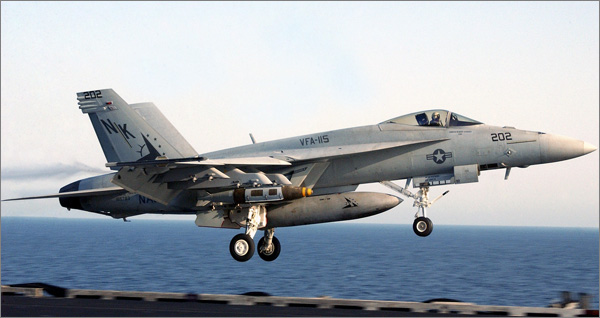I’ve just watched defence minister Joel Fitzgibbon being interviewed on The 7.30 Report about the Super Hornet purchase. It’s not reassuring. When challenged on the performance shortfalls compared with the Russian-built Sukhois being bought by our neighbours — basic factors in a fighter aircraft like speed, acceleration, climb rate and turning circle — he keeps flipping the conversation back to avionics and interoperability. “Never mind the quality, feel the width,” eh Joel? Check it out while the video’s still online and tell me what you think about his body language.
Super Hornets are Go

Defence minister Joel Fitzgibbon has announced that the controversial purchase of 24 Super Hornet aircraft will go ahead.
The review of the Howard government’s decision to buy the aircraft — at a total cost of $6 billion even though the RAAF hadn’t wanted them — reached some damaging conclusions, including:
- There has been a lack of sound, long-term air combat capability planning decisions by the former Government over the course of the last decade.
- The retirement of the F-111 was made in haste but is not irreversible. The cost of turning the F-111 back on would be enormous and crews and skills have already moved on.
- The former Government’s decision to leave Australia’s air defences in the hands of the Joint Strike Fighter project was a flawed leap of faith in scheduling terms and combined with the quick decision to retire the F-111 early, allowed an air combat capability gap to emerge.
- The subsequent timetable the former Government put on the acquisition of an interim fighter left Defence planners with no choice but to recommend the Super Hornet. No other suitable aircraft could be produced to meet the 2010 deadline the former Government had set. One year on, that is now even more so the case.
Cancelling the order would still incur a financial penalty and create “undesirable tensions”, and the final conclusions is that “the Super Hornet is an excellent aircraft… and is the only aircraft which can meet the small delivery window created by the former Government’s poor planning processes and politically-driven responses.”
As a shareholder in Australia Inc, I’d like to know why the former “board members” allowed this to happen. When company directors are negligent they become personally liable so why, given the report’s damning conclusions, does Brendan Nelson not become personally liable?
